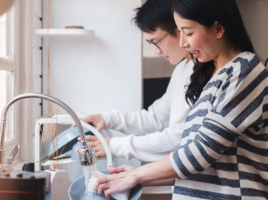Learning about litter with Thetford River Group on World Cleanup Day
The 19th September marks this year’s World Cleanup Day – one day created to unite individuals across the world to clean up our planet.
The initiative started from humble beginnings in Estonia in 2008 and is now run by the Let’s Do It Foundation, an NGO (Non-Governmental Organisation) also based in Estonia. Last year, their World Cleanup Day campaign gathered 21.2 million people across 180 countries, all clearing up litter and mismanaged waste.
This year’s campaign looks a little different – instead of their large group events, this year they’re encouraging individual clean-ups in countries where COVID-19 restrictions won’t allow groups (or where people prefer to lower risk) and even promoting digital clean-ups.
However this year’s clean-up may look, if anything it’s message is even more poignant. With the pandemic, images of littered parks, greens and beaches scattered across the news this summer, and programmes like Attenborough’s ‘Extinction: The Facts’ or even Zac Efron’s Down To Earth (and no, sadly he doesn’t break into song in it) all telling us the stark truth of how badly our planet is suffering.
So, in honour of this campaign, we wanted to learn more about litter, to shine a light on just how big a problem it is as well as learn about organisations in our local area that help conserve our waterways and wildlife.
SaveMoneyCutCarbon meets the Thetford River Group
This got our team thinking – what happens to this litter in our local areas? And how does this impact wildlife where we live?
So, this week we met with the Thetford River Group, who are part of Water Resources East and are a RiverCare Group. The undertake conservation work in and along the rivers Thet and Little Ouse – and it’s not just picking up litter either.
The River Warden, Sean Ready works with the team of local community volunteers to regularly patrol the rivers, collecting litter and monitoring the health of invertebrates and wildlife which helps inform them on the water quality.
They collaborate with the Environment Agency, Water Resources East and Anglian Water, sending the data they collect so that it can provide a bigger picture of the condition of the area’s chalk streams and keep the implementation of the Water Framework Directive on track. They also help to work out the impact of over-abstraction on waterways, helping the community gain a deeper understanding of the way in which their domestic waste water and drinking water form part of the aquatic network in their catchment.
We spoke to Clare Higson, who’s the head of the Thetford River Group, and met with Shaun, Clare and Mike, who all volunteer with the River Group.
They’ve found local wildlife building nests and homes from plastic waste
Working together they cover a large area from Thetford to Santon Downham and even Brandon. Litter affects the Little Ouse and Thet, with fishing wire, half empty coleslaw packets and bread bags left behind.
The pandemic has not helped matters either. Last month after just one period of heavy rainfall, they pulled 3 kilograms of masks and surgical gloves out of the rivers. They have found moorhens making their nests out of bits of plastic bags, and caddisfly larvae that have built their case to grow in from small pieces of plastic instead of just stones, sand, and leaves.
Clare reminds us that it’s not just the fact that wildlife is coming into contact with it, but are most likely ingesting pieces of plastics, and these plastics are degrading in these waterways leaching harmful chemicals that don’t simply go away.
It’s a stark reminder of why we need to reduce the amounts of single use plastics we use and ensure that we’re doing our best to prevent our waste from ending up in our local wildlife’s homes.
If you want to volunteer with Thetford River Group, or learn more you can get in touch with them through their website.
UK households produce more than 27 million tonnes of waste each year
According to Keep Britain Tidy, UK households throw away approximately 25% of all food and drink bought for consumption and generate over 27 million tonnes of general waste every year.
Of that waste, more than 2 million pieces of litter are dropped in the UK daily, costing local authorities almost £700 million cleaning UK streets. That doesn’t consider the litter that pollutes in our waterways and rivers, harming wildlife and having a large impact on biodiversity.
Keep Britain Tidy’s 2020 Litter Composition Analysis report found that cigarette butts account for 66% of litter items when considering individual pieces of litter. Plastic bottles and non-alcoholic cans made up 3% of the litter item count, but when litter volume was analysed this rose to 43%.
The same report found that amongst the litter, the branded items that made up the greatest proportion of litter count were from household brands like McDonald’s, Coco-Cola and Wrigley’s Extra.
Get involved and litter pick in your local area this weekend
Whilst it’s critical for businesses and corporations to reshape their product packaging and move away from plastic, it’s us that can make masses of impacts now with small steps.
Going for a walk this weekend? If you see any waste, pick it up and take it with you. Make sure if you’re picnicking or visiting the beach in the lovely weather that you take all your waste with you to dispose of at home or at the very least in the nearest litter bin.
Start swapping to more sustainable alternatives too – we’ve created a range of sustainable living products that are of excellent quality and great user experiences (we should know – we tested them ourselves!).


